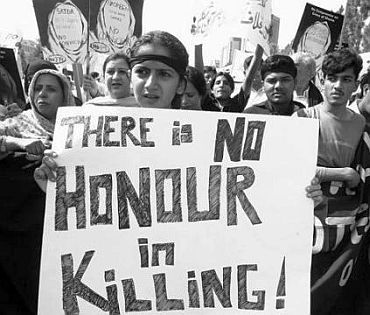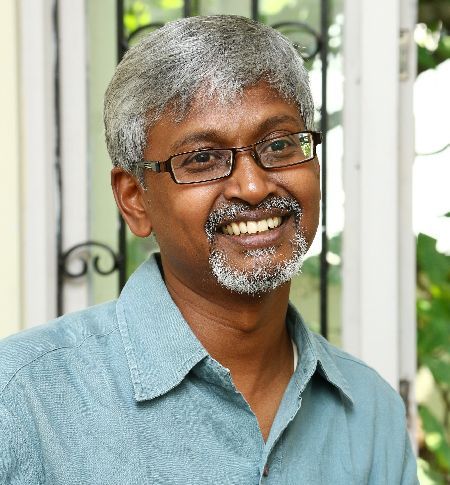 'Most of those involved in these honour killings are people who belong to the class that feels left out.'
'Most of those involved in these honour killings are people who belong to the class that feels left out.'
'The high development index in a way is perpetuating conditions that result in social tension.'
'The only solution to the problem is politicise inter-caste marriages.'
Dr M Vijayabaskar, an associate professor at the Madras Institute of Development Studies, is also a guest faculty at the Department of Humanities and Social Sciences, IIT-Madras.
A social scientist who specialises in the political economy of regional development and rural-urban interactions, he explains the reasons behind the so-called 'honour killings' that occur at an alarming rate in Tamil Nadu, of late. Dr Vijayabaskar, below, left, spoke to Shobha Warrier/Rediff.com
Tamil Nadu tops the country in the fields of education, literacy, healthcare, industrial output, etc. In fact, it has topped the country in Sarva Shiksha Abhyan pushing Kerala to second place.
At the same time, the state is witnessing honour killings in the name of caste which we associate with backwardness. Is there not a dichotomy in the situation?
The economic condition is behind this kind of tension in society. First, those who belong to the castes that are classified as backward castes or the most backward castes do most of these killings.
A process of economic differentiation is taking place within these backward castes or the non-Dalit castes, especially in the post-nineties period.
This economic differentiation is a result of two reasons. One is due to the crisis in the agricultural sector because of the steady fragmentation of land holdings.
If you look at the average land holding per household, it is one of the lowest in the country at less than two acres according to the 2011 data.
Though poverty levels are one of the lowest in the country, if you look at the section where the decline has happened, it is more among the agricultural labourers than among the cultivators.
Dalits constitute the agricultural labour class. So within the cultivators, there is some kind of a crisis.
60 per cent in the reduction in poverty in Tamil Nadu has been due to the functioning of the public distribution system.
Earlier, landless labourers had to depend on land owners for food, but PDS has undermined the control the backward castes had over the Dalits.
PDS has in a way undermined the agrarian social relationship, which sustained the agrarian economy for several decades. This is a crucial change.
I would go to the extent of saying the high development index in a way is perpetuating conditions that result in social tension.
Along with this, a majority of the backward caste people have invested in education in a big way, and that has made them highly mobile.
A combination of the reservation policy and affirmative action in education has lead to this situation. The largest number of youth between the ages of 18 to 25 in higher education is in Tamil Nadu, even more than Kerala.
Has this mobility not happened among the Dalits?
Only on a very small scale, and definitely not on the same scale as the backward castes.
So on one hand, there is a section in the backward castes that has become assertive, economically independent and upwardly mobile while there is a segment that feels they have been left out of the growth process.
According to me, most of those involved in these killings are the people who belong to the class that feels left out.
Another important point is these killings are not called 'honour killings' in Tamil. It is Aanava kolai aanavam, means arrogance or insolence.
You mean there is no feeling of 'honour' involved in these killings?
No, there is no feeling of honour involved in these killings. The community itself discarded the phrase gaurava kolai, which means honour killing.
You have to remember caste always works through patriarchy. So there is a crisis of masculinity among the male members of this section who feel they are left out in the growth process. There is nothing like a proud farmer today unlike in the sixties and the seventies!
But there are not enough employment opportunities for these educated backward caste youths, especially in the government sector. They somehow think Dalits are responsible for them not getting jobs though this is actually not true.
For example, a Vanniyar youth living in a village does not realise that a Vanniyar boy in Chennai is more equipped to get a job than him.
 If you look at the killings, you see that though it is acceptable for a Dalit girl to marry a backward caste boy, it creates tension only when a backward caste girl marries a Dalit boy...
If you look at the killings, you see that though it is acceptable for a Dalit girl to marry a backward caste boy, it creates tension only when a backward caste girl marries a Dalit boy...
That has to do with patriarchy based on which caste relations work. Let's face it, marriages in India are not about love, but about strengthening kinship ties and expanding your sense of economic security.
Today, there is a strong sense among the backward caste people left out in the villages that their masculinity has been eroded.
Perumal Murugan has written an interesting novel which talks about how a peasant who thinks he is successful, fails to find a girl to marry as no girl wants to marry a peasant. This is the true depiction of reality.
These men feel they are losing their ability to control women in their families. So when a Dalit man marries a girl from their family, the volcano erupts.
Is it because they could not accept Dalits rising above their previous position as landless labourers?
Definitely, yes.
Is not social mobility of the Dalits a reason for this?
Yes, because of social mobility, they could assert themselves, which has not been acceptable to the other section.
Along with that, there are disgruntled elements within the backward castes who are left behind. When these two work simultaneously, it creates this kind of crisis.
One thing I found out when I spoke to the young people of a village after such a murder was that if the boy has a good job, the girl's parents have no objection in the marriage. Caste does not an issue then. Only when they elope as students that all the problems arise. So, economics undermines all other problems.
Some reports say that inter caste marriages are going up, but girls and boys are killed for marrying from other castes which a state like Tamil Nadu had not witnessed 20 or 30 years ago.
If you look at the history of Tamil Nadu, during the times of Periyar and Anna, there was a strong movement encouraging inter-caste marriages. Periyar used to attend only inter-caste marriages while Annadurai legalised self-respect marriages to encourage inter-caste marriages.
What has happened later is the Dravidian parties lost their radical edge especially regarding caste and patriarchy to gain electoral gains.
The Left parties never politicised inter-caste marriages. Today, no political party is talking about inter-caste marriages. If you notice, today, there is a total silence on this issue.
In a way, support for same caste marriage and violence against inter-caste marriage are interlinked.
Do you hold caste-based parties like the Pattali Makkal Katchi responsible for a situation like this?
I am not saying the PMK is not responsible, but you have to look at why the PMK is politically successful in taking an anti-Dalit and pro-honour killing stand. How are they able to convince the Vanniyar youths against the Dalits?
There is no point in saying that the PMK is responsible and the other Dravidian political parties are silent on this issue, etc.
The only solution to the problem is politicise inter-caste marriages.
Dr M Vijayabaskar's photograph: Sreeram Selvaraj











 © 2025
© 2025